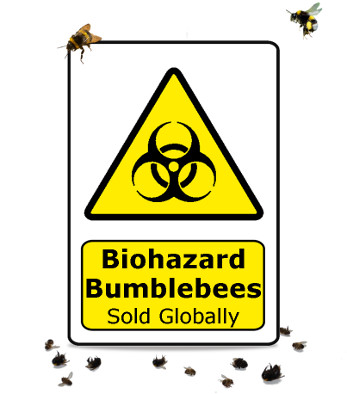Statement from Natural England on bumblebee licensing for 2015
Natural England has now completed reviewing the responses to our recent public consultation on the licensing of the release of non native bumblebees for the purposes of crop pollination and research. Currently the release of these commercially reared pollinators is permitted under Natural England’s class licence WML-CL22. Defra and Natural England wish to see the use of native commercial bumblebees as the default position for growers and researchers in England.
In light of the risks identified in the recent risk assessment on the release of non native bumblebees, the ability of the bumblebee producers to rear native bumblebees and the fact that many growers have already switched to using native hives, Natural England has decided not to renew class licence WML-CL22 for 2015. The majority of the respondents to our consultation also supported the move to greater use of native bumblebees.
Some respondents did tell us of their concerns about the bumblebee industry not being able to supply enough native bumblebees at the right time to ensure crop pollination. We consider that good forward planning by the industry, suppliers and growers will address many of these concerns. However, we have decided that in the unlikely situation that there is a shortage of native hives we will issue an emergency class licence which will permit growers and researchers to release non native bumblebees when it is not possible to obtain native hives.
Growers and researchers who wish to release non native bumblebees in any other circumstances will need to apply to Natural England for an individual licence under the Wildlife and Countryside Act. Applicants will need to demonstrate a clear need to release non native bumblebees, rather than native bumblebees, as part of the licensing process.
How this change will work
Class licence WML-CL22 will cease on the 31st December 2014. Those few growers who are still using non native bumblebees in January to March 2015 may continue to use them so long as the hives were introduced into the greenhouse / poly-tunnel before 1st January 2015 – ie there will be no need to remove non native hives which are already in use on the 1st January.
With the termination of WML-CL22 all growers and researchers who had previously registered to release non native bumblebees, and had kept this registration active by sending in annual licence returns, will no longer be registered to release non native bumblebees. However, it is still a condition of class licence WML-CL22 that growers and researchers need to send in a licence return if they released non native bumblebees during 2014.
If growers and researchers need to make use of the 2015 emergency class licence they will need to email or ring NE’s Bristol office (contact details will be provided on the class licence which will be available on the government website) at the time that it becomes apparent that their suppliers can not provide them with native hives. It will no longer be possible to register to use this emergency licence at the start of the year in anticipation that a supplier may have difficulty providing enough native hives. The following information will be required:
- Address where non native bumblebees will be released, including site post code
- Provide a short description of the site – greenhouses, poly-tunnels or both
- Crops which will be pollinated by the non native bumblebees
- If for research use – the nature of research to be carried out using non native bumblebees
- Explanation as to why native commercial bumblebees were not available and the actions taken to obtain native hives.
Natural England will review the use of this emergency class licence to ensure that this is only being used in genuine emergencies. We will take account of the situation that some growers will be in pollination service agreements and may not be able to terminate these agreements. In these circumstances we will seek the reasoning from these service providers as to why they have been unable to supply native hives.
More from Natural England here
More coverage;
Bumblebees face new immigration rules (Buglife – The Invertebrate Conservation Trust)
Response to consultation to permit the release of non native subspecies of the bumblebee (The Bumblebee Conservation Trust)

 Results from my newly published work,
Results from my newly published work,